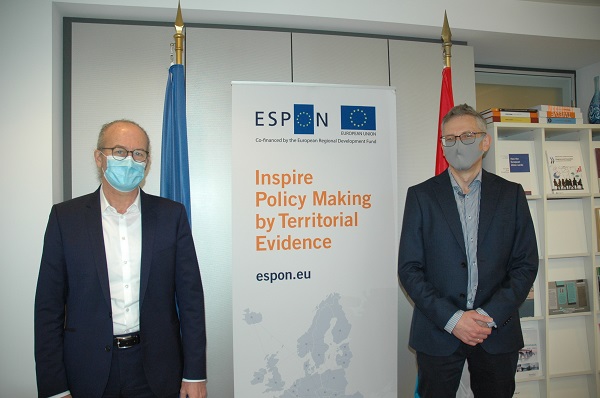 L-R: Claude Turmes, Luxembourg's Minister for Spatial Planning; Wiktor Szydarowski, Director of ESPON EGTC;
Credit: MEA, DATer
L-R: Claude Turmes, Luxembourg's Minister for Spatial Planning; Wiktor Szydarowski, Director of ESPON EGTC;
Credit: MEA, DATer
On Thursday 28 January 2021, Luxembourg's Minister for Spatial Planning, Claude Turmes, met with Wiktor Szydarowski, the new director of ESPON EGTC, a Luxembourg-based European Grouping on Territorial Cooperation managed by the Department of Spatial Planning.
With a doctorate in geography and regional planning, Wiktor Szydarowski has taken over the management of ESPON EGTC at a pivotal moment in the ESPON programme: between the finalisation of the current 2014-20 programming period and preparation of the future 2021-27 period.
During their meeting, Minister Claude Turmes and Wiktor Szydarowski took stock of the activities carried out by the programme and shared their views on the results obtained as well as on the future prospects of the programme in close connection with the implementation of the objective of the territorial cohesion of the European Union (EU).
Luxembourg's Spatial Planning Minister expressed his satisfaction with the production of several territorial data and analyses relevant to various sectoral policies. Emphasising the contribution of the ESPON programme to the implementation of Luxembourg's Territorial Agenda 2030, Minister Claude Turmes stated: “I am proud that the ESPON programme, which I host in Luxembourg, produces and delivers a vast panoply of data, analyses and maps synonymous with knowledge and knowledge unique in Europe".
Regarding the challenges facing the European continent, particularly due to changes already underway and reinforced by the COVID-19 crisis, Minister Claude Turmes reaffirmed the importance he attaches to wind energy policy, especially on the high seas, functional areas and the urban environment.
ESPON's projects within the framework of applied research and targeted analyses present case studies in order to illustrate good practices or to deepen the territorial analysis for a certain territory. During the current 2014-20 programming period, three case studies were dedicated to Luxembourg:
- the “Quality of Life Measurements and Methodology” (QoL) project, which focusses on the Luxembourg Index of Well-Being, developed by STATEC
- the "Circular Economy and Territorial Consequences" (CIRCTER) project, which illustrates the situation in Luxembourg through indicators concerning the flow of materials and waste and presents an analysis of the territorial implications of a transition towards a circular economy
- the "Thinking and Planning in Areas of Territorial Cooperation" (ACTAREA) project, which presents prospects for cooperation in the functional cross-border region of Luxembourg based on the areas of labour market, housing and transport, energy production and consumption and food supply.
At the end of the meeting, Minister Claude Turmes assured the new director of ESPON EGTC of the support of the Department of Spatial Planning as the managing authority in the continuation of the work of the programme by emphasising the importance and the need to continue to produce quality, rigorous and useful scientific analyses.
ESPON is a pan-European programme managed by the Department of Spatial Planning (DATer) of Luxembourg's Ministry of Energy and Spatial Planning on behalf of all EU Member States, as well as Iceland, Liechtenstein, Norway and Switzerland.
The ESPON 2020 programme represents the European network of territorial observation which provides scientific analyses and issues recommendations for territorial and sectoral policies in various contexts, such as economy and finance, employment, direct foreign investment, the circular economy and low carbon emissions, health, migration and efficient governance. Adopted on 26 May 2016 by the European Commission, the ESPON 2020 programme for the 2014-20 programming period has a budget of €48,678,851, including €41,377,019 from the EU (85%) and an additional €1,850,000 from partner countries.









